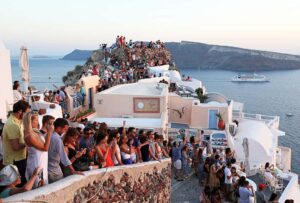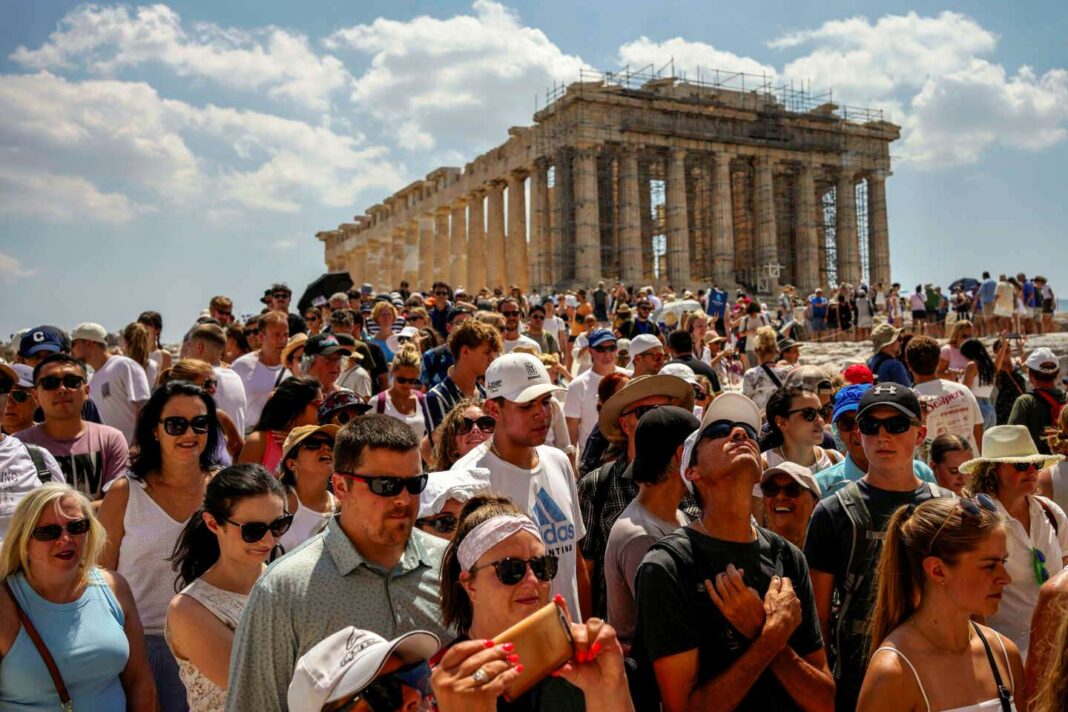It is August 15, 2014 in Syntagma Square, the nerve center of Athens. The streets are deserted, there are no taxis around, and the only shops with their shutters up are the travel agencies, where it is impossible to find a ticket to the Cyclades Islands because all the ferries are full to capacity on this national holiday of The Assumption of the Virgin Mary.
Although the economic crisis that has plagued the country since 2008 is far from over, Athenians are enjoying a few days of vacation. There are alternatives for those who cannot afford a hotel on the islands: cheap rooms, free camping on the beaches, and family homes that are empty the rest of the year.
Ten years later, summer is completely different in Greece. Every year, more than 33 million visitors come to a country of 11 million people. In August, the stores in the capital no longer close. Athens has gone from being a one- or two-day stopover for people on their way to the islands to becoming a destination in itself. You can no longer visit the Acropolis without booking a ticket at least one or two days in advance, because the archaeological site is at its maximum capacity each day. The authorities have set a limit of 23,000 visitors per day, 3,000 more than last year. Most islands have banned free camping and they impose fines on anyone who pitches a tent on a beach.
One of the places where the change is most evident is Neos Kosmos. This once working-class neighborhood, located 15 minutes on foot from the Acropolis and 20 from Syntagma Square, was once inhabited by working-class families, many of them first- or second-generation migrants from Albania. Over the last five years, groups of Albanian workers have been replaced on the sidewalk terraces of bakeries by tourists staying in Airbnbs. Tourist apartments have spread out of control throughout the neighborhood, to the point that it is almost impossible to see a doorway without the small boxes with a numerical code in which the owner company deposits the keys for the guests. According to various studies, Athens is the European city with the lowest percentage of private owners, and more than 70% of the apartments offered on Airbnb are owned by companies that own more than one property.
The Mediterranean country is breaking occupancy records as citizens question whether it is worth maintaining a model that brings more problems than benefits
Overcrowding has become a problem on the Greek islands. Mykonos and Santorini are the most extreme examples. Since 2022, these two islands have been breaking records for tourist over-demand, with an average of 110 overnight stays per resident. To put the figure in perspective: on the island of Corfu, which is also very touristy, the average number of overnight stays per resident is 81; in Croatia it is 66 nights per resident, and in the German region of Mecklenburg-Western Pomerania, which is considered a tourist destination, it is barely 18 nights per resident. Prime Minister Kyriakos Mitsotakis announced that, from 2025, the State will charge a fee of €20 to each tourist disembarking from a cruise ship in Santorini or Mykonos. The fee will only be in effect during the summer, during the high season.
Prices have skyrocketed. According to Eurostat, the average price of package holidays in Greece rose by 7.7% this July compared to 2023. This increase is higher than the European average, which recorded an increase of 6.6%. It should be noted that the brunt of the increase fell on domestic tourism. While for locals holidays became more expensive by 11.1%, for foreigners the increase was 5.7% on average.

Mayors sound the alarm
The mayor of Athens, Haris Doukas, from the socialist Pasok party, opened the can of worms by admitting that the capital is not making a profit from all that tourism. Speaking to Euronews, he said: “Each visitor only contributes €0.40 to the city’s public accounts, and we haven’t even seen that money.” Doukas noted that while tourism is a significant source of capital, it also increases prices and makes it harder to access housing, so the current model exacerbates inequalities in cities.
On July 23, 11,000 cruise ship passengers disembarked in Santorini, a record for a single day on the tiny island with a total population of 17,000. Santorini councilor Panagiotis Kavallaris wrote a Facebook post that caused a huge stir by urging residents to stay at home, as if it were an emergency. “Urgent Announcement: Another difficult day for our city and island with the arrival of 17,000 cruise ship visitors!!! Caution is requested and we must reduce our movements as much as possible!!!” he wrote in the post, which he later deleted.
To get out of the situation, a meeting was called with senior officials from various ministries, the mayor of Thira (Santorini), the governor of the South Aegean region and deputies from the Cyclades. The discussion included a proposal to limit the number of cruise ships arriving on the island. Santorini Mayor Nikos Zorzos proposed limiting the number of cruise passengers per day to 8,000 starting in 2025. Zorzos told local media that his administration has “managed” to reduce the number of peak occupancy days (when visitors exceed 11,000) from 63 last year to 48 in 2024. Eurostat data for 2022 shows that the accommodation sector in Greece had the highest share in gross added value among EU countries, at 7.1%, ahead of Croatia, Portugal and Spain.
The University of Lisbon researcher Agustín Cocola argues that the tourist specialisation of southern Europe is not a recent phenomenon but dates back to the end of the 19th century, but has accelerated in recent decades. The paradigmatic case is Barcelona, a city that has become increasingly touristy in the wake of crises in a timeline that goes from the Universal Exhibition of 1888 in response to the crisis of 1868, the tourism liberalization of the late period of Franco’s regime, and the most obvious transformations that followed the crises of 1992 and 2008. Greece has opted for tourism to overcome the great recession of 2008 and the Covid pandemic of 2020. But the big question is, what solution can be given to the crisis of a tourism model that has reached its limit? -El Pais / Photo: Le Monde



